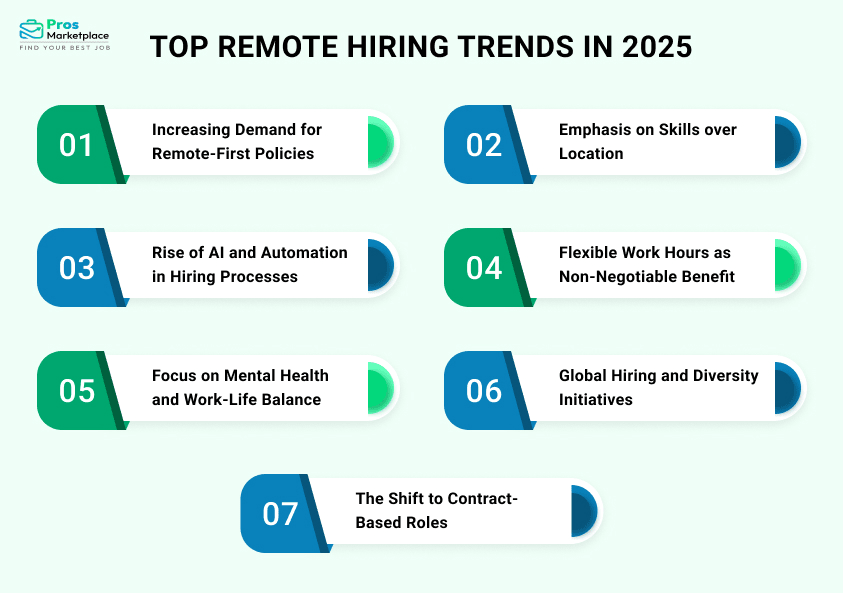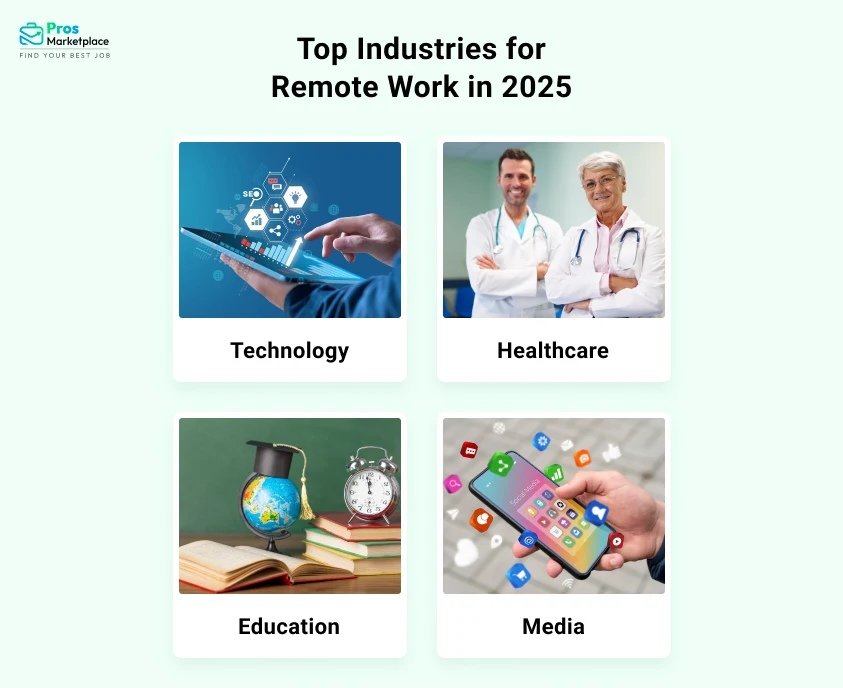Remote work has revolutionized business operations, offering flexibility, innovation, and significant opportunities. Hiring trends are evolving rapidly, presenting employers with both challenges and opportunities. According to Gloroots, 74% of companies plan to make remote work a permanent fixture post-pandemic. To remain competitive, businesses must adapt to these changes and understand how they impact various industries. From technology to healthcare, sectors are reshaping their hiring practices through AI recruitment to embrace the potential of a distributed global remote workforce. Let’s explore the top remote hiring trends in 2025 and how businesses can capitalize on them.
Top Remote Hiring Trends in 2025

1. Increasing Demand for Remote-First Policies
Companies are shifting from remote-friendly to fully remote-first models, making remote work the default. This reduces reliance on expensive office infrastructures and opens access to a global remote workforce.
Tech companies like GitLab and Zapier operate almost fully remote. Similarly, education platforms like Coursera and Udemy rely on remote educators and instructional designers to meet the growing demand for online learning. To stay competitive, businesses should develop clear remote work policies and invest in tools for seamless onboarding and teamwork.
2. Emphasis on Skills Over Location
Remote work has minimized geography’s role in hiring. Employers now prioritize skills, experience, and culture fit over physical location.
For example, telemedicine platforms hire remote patient coordinators and medical coders to meet rising demand. Similarly, marketing agencies seek skilled PPC managers and SEO specialists to enhance online visibility. To attract the best talent from a global remote workforce, businesses should incorporate skill-based assessments and practical projects into their hiring processes.
3. Rise of AI and Automation in Hiring Processes
AI and automation are revolutionizing recruitment by streamlining resume screening, conducting AI-driven interviews, and analyzing candidate assessments.
In the finance industry, AI tools help identify talent for blockchain analysis or risk management roles. Retail companies use automation to hire remote customer service representatives efficiently. While AI enhances efficiency, it’s essential to balance automation with human oversight to maintain a personalized candidate experience.
4. Flexible Work Hours as a Non-Negotiable Benefit
Flexibility in work hours has become a major factor in recruiting and retaining remote employees. This trend is especially prominent in IT and software development, where teams work across time zones.
Creative professionals like graphic designers and writers also benefit from flexible schedules, which boost creativity and productivity. Employers can meet this demand by adopting asynchronous workflows and clear communication protocols to support flexible arrangements.
5. Focus on Mental Health and Work-Life Balance
Remote work often blurs the line between professional and personal life, increasing the risk of burnout and isolation. To address this, companies are prioritizing mental health and work-life balance.
Businesses are introducing wellness programs and mental health support systems. For example, remote HR professionals benefit from personalized mental health resources, while healthcare companies are hiring counselors to support distributed teams. Employers should provide wellness resources, encourage breaks, and conduct regular check-ins to foster a supportive work environment.
6. Global Hiring and Diversity Initiatives
Remote work has broken geographical barriers, enabling companies to hire talent from diverse cultural and regional backgrounds, thereby promoting a global remote workforce. This approach expands talent pools and fosters innovation through fresh perspectives.
In technology, diverse development teams drive creativity and problem-solving. Media companies hire journalists and editors globally to create inclusive content. To maximize these benefits, businesses should embrace inclusive hiring processes, invest in AI recruitment, and provide cross-cultural training for distributed teams.
7. The Shift to Contract-Based Roles
Many companies now rely on contract-based hiring to access specialized skills for specific projects. This approach offers flexibility and scalability without committing to long-term employment.
Industries like creative design and consulting often use contract-based roles. For instance, management consultants work on a project basis to solve targeted business challenges. To ensure successful outcomes, businesses should clearly define expectations, offer competitive compensation, and build long-term relationships with contractors.
Top Industries for Remote Work in 2025

Several industries are leading the shift to remote work, leveraging flexibility and global talent to improve efficiency and innovation.
1. Technology
Tech companies like GitLab and Zapier thrive with fully remote teams, reducing operational costs and accessing broader talent pools. Innovations such as AI recruitment enable these companies to identify and hire the best talent.
- Actionable Insight:
Invest in communication tools like Slack and Notion, and use virtual team-building activities to strengthen collaboration.
2. Healthcare
The growth of telemedicine has driven demand for remote professionals such as telehealth specialists and medical coders. Companies like Teladoc Health are leading this transformation.
- Actionable Insight:
Adopt secure telehealth solutions and ensure staff are trained in digital health technologies to enhance remote care quality.
3. Education
Remote work has opened global opportunities for educators, instructional designers, and content developers through platforms like Coursera and Udemy.
- Actionable Insight:
Modernize Learning Management Systems (LMS) and provide tools to help instructors create engaging virtual content.
4. Media
Media companies build global teams of journalists, writers, and editors to create content tailored to diverse audiences.
- Actionable Insight:
Invest in collaborative tools like Adobe Creative Cloud and train teams in effective remote communication.
Conclusion
Innovation, flexibility, and inclusivity characterize the world of remote work in 2025. Understanding these dynamics will not only bring success in attracting the best global remote workforce but also keep such players ahead in the market competition curve. From embracing the whole concept of a remote-first to leveraging AI for hiring, prioritizing mental health over almost everything else, to embracing global hiring models, the growth scope has been enormous.
However, understanding these trends is just the beginning. Businesses need to continuously adapt their strategies, invest in AI recruitment, and encourage a culture of ‘work anywhere.’ Such a plan may help them unlock the full potential of remote work and build a resilient, forward-thinking workforce. Work in the future is real, and those who adapt will lead the way.
Ready to embrace these remote hiring trends? Start exploring top talent at Pros Marketplace today and lead the future of work!







